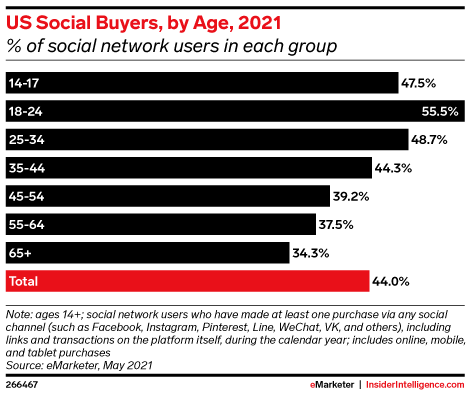How Social Commerce Is Evolving and Impacting Retail

What is Social Commerce?
Social commerce is the marketing, selling, and purchasing of products directly through social media platforms. While still in its early days in the United States, social commerce in China has become a retail powerhouse — generating $400 billion in sales in 2021 and is expected to become a mainstay for global online shopping, forecasted to hit $1.2 trillion in revenue by 2025, reports Accenture. In the US, it’s predicted to reach $80 billion by 2025.
Social commerce combines the experience of social media, connection, and shopping all within the favorite apps that shoppers spend significant time on each day. This streamlines the shopping experience right from the convenience of the user’s device without having to click away in the buying process. It is a powerful trend within eCommerce and retail — one that eCommerce retailers need to participate in to stay relevant.
eCommerce vs Social Commerce
Traditional eCommerce takes place via a brand’s eCommerce site or branded app. While paid social ads may entice social media shoppers to click on the ad, it will then take them to that online retailer’s owned digital properties to complete the sale. Social commerce happens entirely within a social media platform, often through live streaming events, live shopping, influencer’s posts, or the brand’s own social account that offers a buy button in its posts.
Who Partakes in Social Shopping?

Social shopping is particularly attractive to Gen Z, as more than half of US social media users aged 18-24 have made purchases via a social channel. However, an average of 44 percent of US social media users aged 14 to 65+ have also done so. It’s easy to see why online shoppers enjoy buying through social media platforms — they’re already in the channel, they trust influencers’ opinions, and they can purchase with the ease of a click without having to leave their app.
In addition to mega brands, the social commerce market is filled with small businesses and entrepreneurs that create a close-knit community of followers and provide highly personalized service, interactions, and experiences. Potential customers are exposed to a much broader array of innovative new products than is often seen in traditional eCommerce. Additionally, social posts have the capacity to go viral, meaning that a product or offer can very quickly reach millions of potential customers.
Why is Social Commerce Appealing?
Social commerce engages customers through individuals, influencers, and brands. It’s popularity tends to be driven by:
- Engaging content. User generated content (UGC) and brand generated content inspire potential customers by providing interesting, relevant information and opinions that often feature videos of products in real life. Shoppable posts and in-app stores on major social platforms make it easy for social media users to choose to buy right then and there.
- Experiences that feel inclusive. Livestreaming is popular and offers social media users the opportunity to be in the moment and participate in limited time only opportunities to purchase products. Some social commerce brands offer AR/VR experiences that let users try on products virtually before buying. Experiences that make new customers feel valued and part of the brand’s culture are attractive to social buyers.
- Micro-influencers. In addition to major influencers with millions of followers, many social commerce purchase decisions are driven by micro-influencers who have less than 10,000 followers. These micro-influencers seem to have more sway with their cohorts, are less expensive options in influencer marketing campaigns, and also have more niche audiences. Social commerce brands can more easily reach highly targeted audiences by aligning with micro-influencers.
Social Media with Social Commerce Platforms
Outside of China’s social platforms, four major social media platforms offer native social commerce functionality:
- Facebook. Meta’s flagship leads the way with 71% of global Facebook users (nearly 60 million people) buying from the platform at least some of the time. Retailers open a Facebook Business account, then create a Facebook shop and Facebook page, with a customizable storefront where they can upload or create a product catalog. Customers use Facebook Messenger to interact with the brand or seller via messaging, and purchase in-app via Facebook Checkout.
- Instagram. The platform reports that 44% of people buy products on Instagram weekly. Business account holders set up Instagram Shops to showcase products with images, videos, and livestreaming.
- TikTok. This newer-to-the-US social platform reports that 39% of users have found a product they weren’t aware of before and nearly half have made a purchase. Brands create a TikTok for Business account, add shopping tabs to their profile, and use a virtual storefront to engage shoppers.
- Pinterest. This social media platform is image based. More than 400 million people per month create mood boards, pin their favorite images into categories of their interest, and use it for product discovery. Social commerce retailers can upload images of their products to Pinterest to expand their reach.
Other social networks, like Snapchat, have or are developing a social commerce strategy to take part in this growing movement.
Top 7 Benefits of Social Commerce
Adding social commerce to an eCommerce retail strategy has multiple benefits:
- Drives customer experiences where customers are already spending time.
- Delivers a frictionless online shopping experience.
- Enables a more personalized engagement with customers.
- Empowers businesses to reach larger or more targeted audiences.
- Facilitates direct customer feedback and data gathering.
- Expands eCommerce sales and revenue streams.
- Creates a way for brands to introduce new products, expand brand awareness, and enter or test new markets.
How Retail Brands Can Engage in Social Commerce
With social commerce becoming a dominant force in eCommerce, retailers need to develop a social commerce strategy that will harness the power of this new channel. Social selling is expected to become a mainstay in online shopping, and no doubt will become part of a blended, omnichannel experience.
Here are ways retailers can engage in social commerce:
- Deploy a social commerce platform within existing social media channels
- Create an influencer marketing campaign that includes micro-influencers
- Curate unique experiences on social with options to buy products during those experiences
- Ensure the purchase process in the social platform is frictionless
- Develop UGC and video content that showcases products in real life, instructions, and ideas on how to use products in creative ways
- Partner with other brands to feature unique offers and sales
- Dedicate a customer care team to be responsive to social commerce interactions
Social commerce is shaping retail in new ways. To be successful at social commerce, brands need a fast, accurate, and convenient order fulfillment process. This may include traditional fulfillment or dropshipping that makes sure that customers that buy within social platforms have a smooth checkout, order processing, fulfillment, delivery, and returns experience.
Radial offers brands the support they need for social commerce experiences by providing order fulfillment solutions that focus on an exceptional customer experience.
Please note: Radial no longer offers a Customer Care solution as of September 15, 2024.
Learn how Radial can support you in social commerce
